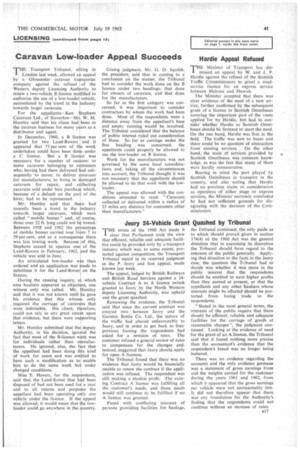Caravan Low-loader Appeal Succeeds Hardie Appeal Refused
Page 43

If you've noticed an error in this article please click here to report it so we can fix it.
THE Transport Tribunal, siting in
London last week, allowed an appeal by a Gloucester caravan transporter company against the refusal of the Western deputy Licensing Authority to renew a two-vehicle B licence modified to authorize the use of a low-loader vehicle, necessitated by the trend in the industry towards larger caravans.
For the appellants—Ken Stephens Caravans Ltd., of Staverton—Mr W. M. Huntley said that his client had Ibeen in the caravan business for many y ars as a distributor and agent.
In December, 1960, a B lice ice was granted for two Land-Rovers and it appeared that 75 per cent of tlje work undertaken could have been do e under a C licence. But a B licence was necessary for a number of reasons: to move caravans belonging to customers who, having had them delivered had subsequently to move; to deliver caravans for manufacturers; to bring in damaged caravans for repair, and collecting caravans sold under hire purchast which, because of a default on the par of the hirer, had to be repossessed.
Mr. Huntley said that th e had recently been a trend in the ndustry towards larger caravans, whici were called " mobile homes" and, ofl course. those over 22 ft. long could not be towed. Between 1958 and 1962 the pefcentage of mobile homes carried rose from 7 to 59 per cent, and as a consequenee there was less towing work. Because of this, Stephens ceased to operate one of the Land-Rovers in February, 1962, vehicle was sold in June.
nd the An articulated low-loader w s then ordered and an application was 4nade to substitute it for the Land-Rover on the licence.
During the ensuing inquiry, at which nine hauliers appeared as object rs, one
witness only was called. Mr. untley said that it was not known until he gave his evidence that this witness only . required the carriage of caravans that were indivisible. His client, therefore, could not rely to any great extent upon that evidence, but there were supporting letters.
Mr. Huntley submitted that the deputy Authority, in his decision, igno ed the fact that most of the B-licence w rk was for individuals rather than anufacturers. He ignored, also, the fact that the appellant had been doing this kind of work for years and was eat tied to have such a modification as to enable him to do the same work but under changed conditions.
Miss E. Havers, for the resp ndents, said that the Land-Rover that h d been disposed of had not been used fair a year and to all intents and purpoies the appellant had been operating oily one vehicle under the licence. If the appeal was allowed, it would mean that te lowloader could go anywhere in the 4ountry.
Giving judgment, Mr. G. D. Squibb, the president, said that in coming to a conclusion on the matter, the Tribunal had to consider the work done on the B licence under two headings: that done for owners of caravans, and that done for the manufacturers.
So far as the first category was concerned, it was important to consider contractors by whom the work had been done. Most of the respondents were a distance away from the appellant's base and empty running would be involved. The Tribunal considered that the balance of public interest ruled out consideration of those. So far as carriage under the first heading was concerned, the appellants could properly be allowed to use the low-loader on B licence.
Work for the manufacturers was not governed by the same local considerations and, taking all the circumstances into account, the Tribunal thought it was not necessary that the appellants should be allowed to do that work with the lowloader.
The appeal was allowed with the conditions amended to read: "Caravans collected or delivered within a radius of 25 miles any distance for customers other than manufacturers." E Minister of Transport has dis missed an appeal by W. and I. P. Hardie against the refusal of the Scottish Traffic Commissioners to grant a roadservice licence for an express service between Melrose and 14awick.
The Minister accepted that there was clear evidence of the need of a new service, further confirmed by the subsequent grant of a licence to Scottish Omnibuses covering the important part of the route applied for by Hardie, but had to consider whether Hardie or Scottish Omnibuses should be licensed to meet the need. On the one hand, Hardie was first in the field. The traffic was new to buses and there could be no question of abstraction
from existing services. On the other hand, the scale of services provided by Scottish Omnibuses was common knowledge, as was the fact that many of them were hardly remunerative.
Bearing in mind the part played by Scottish Omnibuses in transport in the country, and also noting that Hardie had no previous claim to consideration as operators of either stage or express services, the Minister narrowly concluded he had not sufficient grounds for disagreeing with the decision of the Commissioners.




















































































































